PolyMet Water Pollution Permit
What is the water pollution permit?
Under Minnesota law, PolyMet’s discharge of pollution either to surface waters (wetlands, streams, rivers, lakes) or to underground waters requires a State Disposal System (SDS) permit.
Under federal law, PolyMet’s discharge of pollution into surface waters either directly or through groundwater must be regulated under the Clean Water Act. An April 2020 U.S. Supreme Court decision confirmed that the Clean Water Act covers discharge through groundwater to surface waters that is the “functional equivalent of a direct discharge.” The permit required under federal law is called a National Pollutant Discharge Elimination System (NPDES) permit.
The U.S. Environmental Protection Agency (EPA) typically comments on important draft NPDES permits, like the PolyMet permit, to advise Minnesota regulators whether the permit complied with federal legal requirements.
The Minnesota Pollution Control Agency (MPCA) issued a combined NPDES/SDS water pollution permit to PolyMet on December 20, 2018 and denied requests for contested case hearings. WaterLegacy appealed from MPCA’s permit decision on January 22, 2019. On August 2, 2023, the Minnesota reversed the PolyMet NorthMet permit and rebuked the MPCA for its irregular procedures and “arbitrary and capricious” decisionmaking in issuing the permit.

The St. Louis River near Carlton, Minnesota. Photo by WaterLegacy.
What’s the current status?
On August 32, 2023, the Minnesota Supreme Court reversed the PolyMet NorthMet water pollution permit as “arbitrary and capricious” due to the MPCA’s improper procedures in issuing the permit. The permit has been sent back to the MPCA to analyze whether pollution through groundwater to surface water must be controlled under the Clean Water Act, analyze violations of state groundwater standards, give the EPA an opportunity to comment on the permit in writing, and revise the MPCA’s decision not to set limits on direct wastewater discharge.
Starting in 2018, WaterLegacy filed state Data Practices Act requests and Freedom of Information Act (FOIA) requests and lawsuits, worked with whistleblowers, and secured a special trial to expose MPCA’s improper actions that hid warnings from the U.S. Environmental Protection Agency (EPA). We and our allies revealed that the EPA concluded that PolyMet’s water permit failed to set enforceable limits to comply with the Clean Water Act and state and tribal water quality standards. But the MPCA had taken the unprecedented action of convincing EPA political appointees under the Trump Administration to withhold the EPA’s highly critical comments. MPCA then deleted its “smoking gun” emails with EPA appointees and kept the EPA’s conclusions hidden from the public, the press, and the courts.
In response to the MPCA’s actions, in August 2023—for the first time ever in Minnesota history—the Minnesota Supreme Court concluded that a state agency had engaged in procedural irregularities. In fact, the Court issued a stinging rebuke of the MPCA, ruling that the MPCA’s irregular procedures to hide federal criticisms of the PolyMet permit and to destroy official documents were “danger signals” that the MPCA “did not genuinely engage in reasoned decision-making.”
The Minnesota Supreme Court’s decision to throw out PolyMet’s water pollution permit was a complete vindication of WaterLegacy’s work after many years of investigation and litigation, much of which was supported by the Impact Fund. The Minnesota Supreme Court not only reversed a major PolyMet permit, but also held that “secrecy is unacceptable.” The Court’s decision has already been cited several times, and we believe it will have important precedential value in Minnesota to protect clean water and regulatory integrity.
Most importantly, since the courts stayed PolyMet’s permits while MPCA’s irregular procedures were investigated and litigated, PolyMet was not allowed to begin mine construction. Although PolyMet’s permits were issued in the fall of 2018, five years later no wetlands have been destroyed, no resources needed for the exercise of treaty-reserved rights have been impaired, and none of the streams, rivers, or lakes in the Lake Superior Basin have been polluted by the proposed PolyMet copper-nickel mine.
Read WaterLegacy’s full summary via the Impact Fund social justice blog.
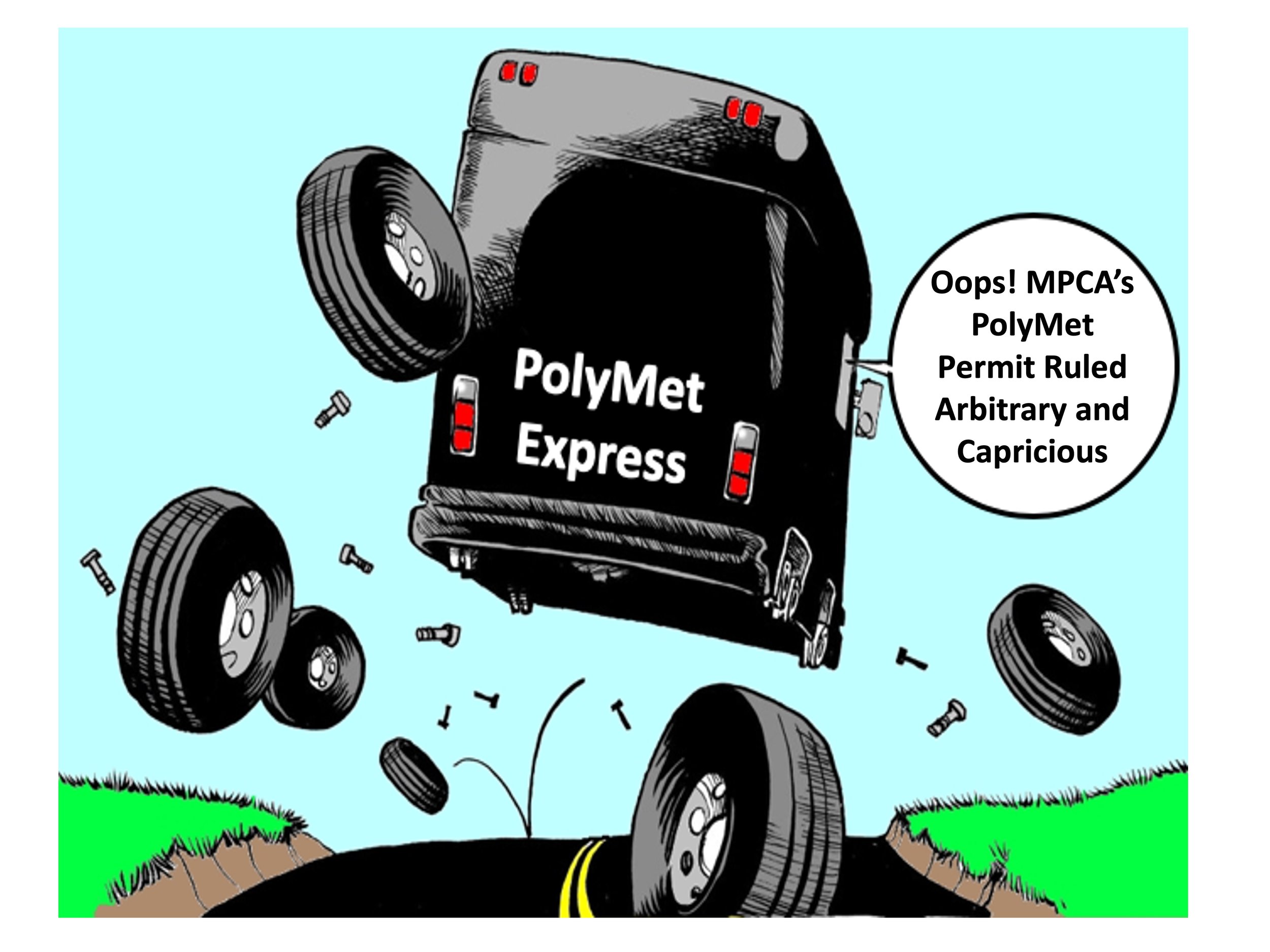
In December 2023, Minnesota Lawyer selected WaterLegacy Counsel Paula Maccabee and other members of the legal team responsible for overturning the water pollution permit among its 2023 “Attorneys of the Year” in the category of pro bono legal services.
Read WaterLegacy’s Press Release on the Attorneys of the Year recognition (Dec. 21, 2023).
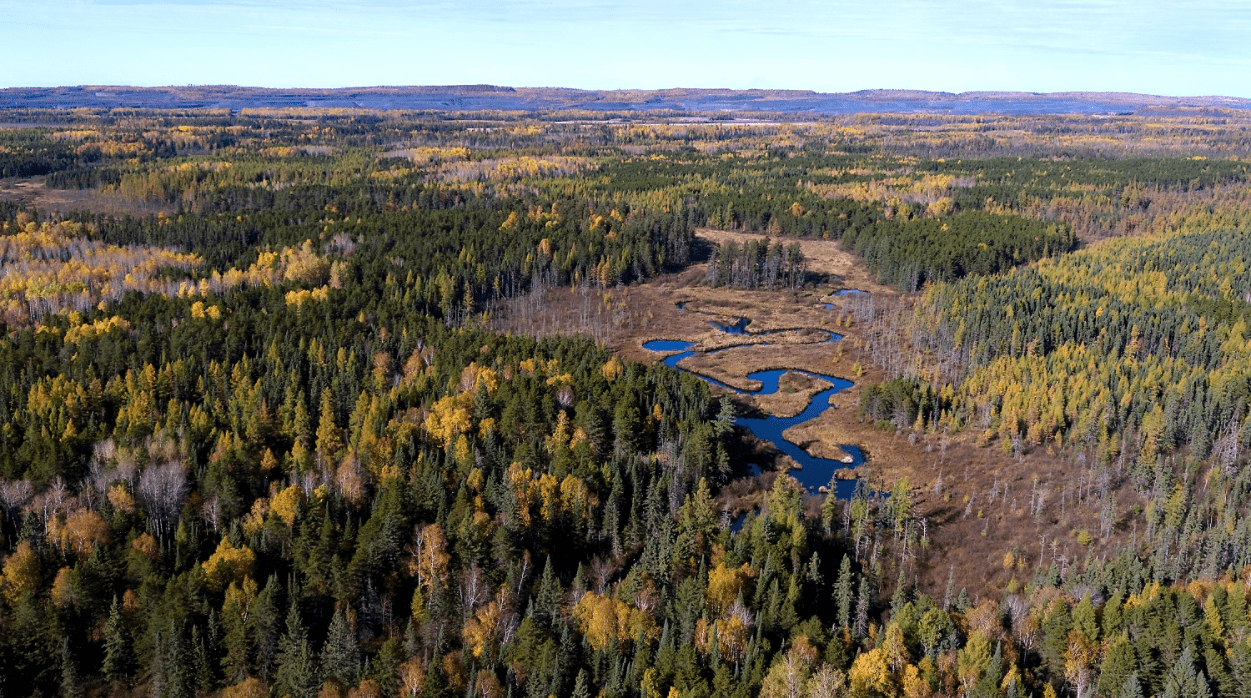
Proposed PolyMet site. Photo by Rob Levine.
PolyMet Water Pollution Permit Timeline
MPCA’s irregular issuance of the PolyMet water permit.
January 31, 2018
MPCA issues draft PolyMet NorthMet NPDES/SDS permit which has no effluent limits on pollution to comply with state or downstream tribal water quality standards and allows seepage from unlined reactive mine waste facilities to groundwater.
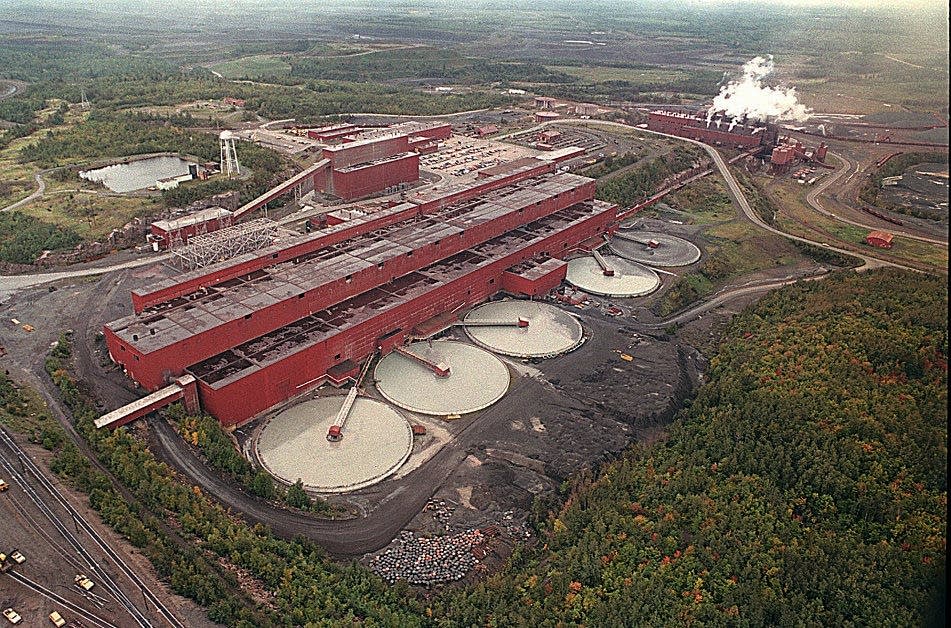
Plant that would be repurposed for PolyMet ore processing. Photo by Marshall Helmberger of The Timberjay.
March 5, 2018
MPCA asks for “wiggle room” where EPA would provide only oral and not written comments on the draft PolyMet NorthMet NPDES/SDS permit.
March 11-15, 2018
MPCA sends emails to EPA political appointees asking that EPA withhold its written comments on the PolyMet NorthMet NPDES/SDS permit. These emails were deleted by MPCA and were only secured from EPA files after WaterLegacy Freedom of Information Act (FOIA) lawsuits and EPA union leaks to the press.
March 16, 2018
Public comment period for PolyMet NorthMet NPDES/SDS permit closes. WaterLegacy submits detailed technical comments, expert opinions, and 77 exhibits opposing the weak PolyMet permit, stating:
- MPCA failed to set water quality-based effluent limits on direct discharge of PolyMet wastewater to surface waters in violation of state and tribal water quality standards and the Clean Water Act.
- MPCA failed to set enforceable limits to prevent PolyMet contaminated seepage through to groundwater and through groundwater to nearly wetlands and streams in violation of state water quality standards and the Clean Water Act.
- MPCA failed to follow federal law protecting the Lake Superior watersheds of the Great Lakes from toxic metals pollution,.
- PolyMet pollution and wetlands change would increase toxic heavy metals and sulfate in groundwater and surface water, impair aquatic life, degrade wild rice, and increase mercury contamination of fish.
Read WaterLegacy’s Comments Opposing MPCA Draft PolyMet Water Pollution Permit (Mar. 16, 2018).
Although EPA’s team of staff and managers also complete a written comment highly critical of the PolyMet NorthMet water permit, EPA political appointees agree with MPCA to delay and not send EPA’s written comments during the public comment period. This delay avoids press coverage and MPCA will neither respond to comments in writing or include them in a record for public and court review.
March 26, 2018
WaterLegacy investigation. Starting March 26, 2018. WaterLegacy submitted seven Minnesota Government Data Practices Act (DPA) for MPCA documents, and nine federal Freedom of Information Act (FOIA) requests for EPA documents; filed two FOIA lawsuits in Washington, D.C. federal court; and interviewed former EPA counsel and the former manager of EPA’s regional NPDES office.
April 5, 2018
EPA manager Kevin Pierard reads EPA comments to MPCA word-f0r-word over the phone. MPCA has a lawyer take notes so there is no publicly available record of this call.
December 20, 2018
MPCA issues PolyMet a combined NPDES/SDS permit that has no effluent limits on pollution to comply with Minnesota or downstream tribal water quality standards.
Investigation of MPCA Procedural Irregularities.
January 15, 2019
WaterLegacy urges House Committee Chairs to Investigate, citing evidence that EPA suppressed comments on Minnesota’s controversial PolyMet NorthMet copper-‐nickel mine.
January 22, 2019
WaterLegacy, along with our allies, files an appeal from the PolyMet NorthMet water pollution permit to the Minnesota Court of Appeals and a statement of the basis for its claims.
February 25, 2019
Congresswoman Betty McCollum Requests Immediate Release of EPA Comments.
Read Cong. McCollum’s letter to Acting EPA Administrator Wheeler.
May 17, 2019
WaterLegacy moves the Court of Appeals to transfer the PolyMet water permit cases to district court to determine if MPCA’s procedures in issuing the PolyMet NPDES/SDS water pollution permit were irregular and to secure critical documents missing from the administrative record produced by MPCA.
June 12, 2019
EPA Reveals Comments to Settle WaterLegacy FOIA lawsuit. On the day its briefs were due, EPA released its written comments criticizing the draft PolyMet permit. EPA’s comments said:
[T]he permit does not include WQBELs [water quality-based effluent limitations] for key parameters and appears to authorize discharges that would exceed Minnesota’s federally-approved human health and/or aquatic life water quality standards for mercury, copper, arsenic, cadmium, and zinc.
Read EPA’s suppressed March 16, 2018 comments on the PolyMet permit.
June 13, 2019
Media Coverage of Newly-Released EPA Comments on PolyMet Permit begins to create pressure for investigation.
Read EPA releases long-sought comments on PolyMet permit, The Timberjay, June 12, 2019.
Read Newly Released Documents Detail EPA’s Concerns Over PolyMet (Extended), MPR News, June 13, 2019.
Read Newly Released Documents Detail EPA’s Concerns Over PolyMet, AP News, June 13, 2019.
June 14, 2019
EPA Office of Inspector General Opens PolyMet Oversight Investigation.
Jeffry Fowley, former EPA attorney, filed a complaint with the EPA Office of Inspector General watchdog, accusing both EPA and MPCA of a “coverup.” and characterizing PolyMet’s permit as weak, and “an end run around the . . . requirements of the Clean Water Act.”
June 18, 2019
EPA Union, AFGE Local 704 leaks smoking gun email from Asst. Commissioner Lotthammer to EPA stating that “MPCA was attempting to suppress those comments from public review.”
Read the email leaked by the EPA union and secured in its complete form by WaterLegacy under the Freedom of Information Act (FOIA).
June 20, 2019
Congresswoman Betty McCollum’s Condemns the PolyMet Permit Cover-up as “an absolutely intolerable breach of the public trust by two regulatory agencies.”
Read the full Star Tribune article with Cong. McCollum’s statement.
June 21, 2019
Star Tribune editorial board opines: “The questions about PolyMet sow doubts not just about this mining proposal but about others to come. A hearing will be crucial to shoring up public trust.”
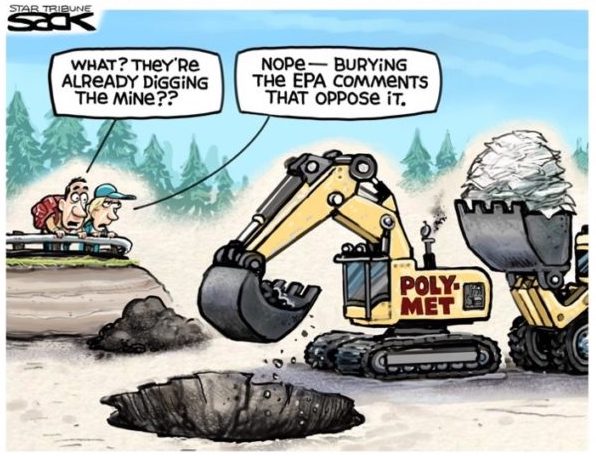
Steve Sack Star Tribune Editorial Cartoon (June 23, 2019)
June 24, 2019
State Representative Rick Hansen calls for Minnesota Legislative Audit Commission investigation.
Proof of MPCA Improper Process and PolyMet Water Permit Failure to Comply with State, Federal, and Tribal Law.
June 25, 2019
MPCA issues draft PolyMet NorthMet NPDES/SDS permit which has no effluent limits on pollution to comply with state or downstream tribal water quality standards and allows seepage from unlined reactive mine waste facilities to groundwater.
Read the Minnesota Court of Appeals June 25, 2019 Transfer Order.
Read the June 25, 2019 AP story in the Washington Post.
August 6, 2019
Court of Appeals suspends PolyMet (NPDES/SDS) Water Pollution Permit due to concerns about irregular process and “the difficulty of stopping a bureaucratic steam roller, once started.” As a result of the permit’s suspension, no pollution or destruction took place while court cases are pending.
Read the Minnesota Court of Appeals Order Staying Permit (Aug. 6, 2019).
January 21-29, 2020
Ramsey County District Court holds a hearing (the first such hearing in Minnesota history) on allegations that PolyMet water pollution permit was issued with irregular procedures.
January 23, 2020, Star Tribune reporting, on testimony of Shannon Lotthammer:
Minnesota pollution regulators had asked the EPA not to send the federal regulator’s serious concerns about PolyMet’s draft permit in writing during the public-comment period, but to hold off. That move kept EPA reservations about the water-quality permit and its ability to control pollution, out of the public record.
On Thursday, the reason became clear. Former Minnesota Pollution Control Agency Assistant Commissioner Shannon Lotthammer, the e-mail’s author, testified that she had deleted it. “I deleted the e-mail knowing that, at least to the best of my knowledge, this was the only e-mail that contained the request,” she testified Thursday.
January 28, 2020, MinnPost reporting on testimony of Kevin Pierard, who was EPA Region 5 NPDES Program Chief throughout the PolyMet water pollution permit process:
Between Jan. 31 of 2018 — when PolyMet’s public comment period opened — and March 5, Pierard said the EPA told state regulators they intended to submit written comments. The public comment period ended March 16.
But in early March, Pierard said MPCA staff asked him “if there was any wiggle room” to delay the EPA’s comments. Pierard testified the request was odd. He could not recall ever getting a similar request on a draft NPDES permit . . . he saw delaying EPA comments for a revised permit as a departure from normal procedure. “That just doesn’t make any sense that we would do that,” he told the court via livestream from Santa Fe, New Mexico. “It’s not our practice and it wouldn’t speed up the process which I think they were concerned about. It actually slows it down.”
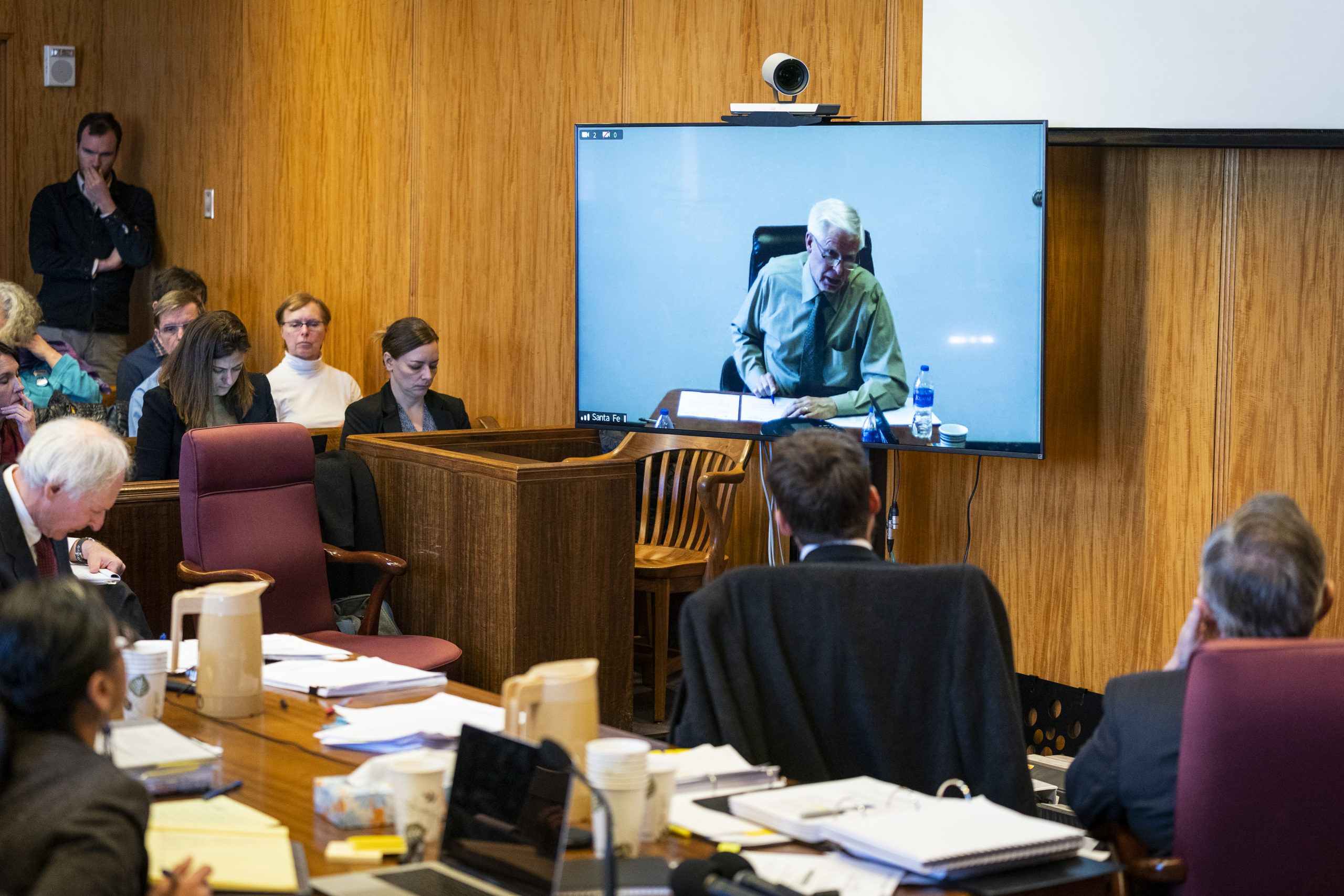
Kevin Pierard, who oversaw the PolyMet water pollution permit at EPA, testifies via video.
Photo by Leila Navidi/Star Tribune via Getty Images.
September 3, 2020
District Court Judge John Guthmann, for the first time in Minnesota history, found that a state agency had engaged in irregular procedures not shown in the administrative record. These irregular procedures included deleting and failing to preserve notes and emails, in violation of Minnesota’s Official Records Act. The court also concluded that MPCA asked EPA to withhold EPA’s comments on the draft PolyMet permit to avoid bad press and to circumvent Clean Water Act rule requirements.
Read the District Court’s September 3, 2020 Findings, Conclusions and Order.

Judge John Guthmann, presiding over hearing on PolyMet permit procedural irregularities.
Photo by Leila Navidi/Star Tribune via Getty Images
November 2, 2020
WaterLegacy appealed from the transfer case order, arguing that MPCA’s actions that prevented EPA from sending its written comments were also irregularities in procedure.
April 21, 2021
The EPA Office of Inspector General (OIG) releases a report that EPA Region 5 did not follow standard procedures for the PolyMet permitting process.
Read the April 21, 2021 EPA OIG Report here.
January 24, 2022
The Minnesota Court of Appeals reversed the NorthMet permit for failure to analyze whether seepage through groundwater affecting surface water should be regulated under the Clean Water Act. The Court of Appeals did not decide which actions by MPCA were irregular procedures. But the Court found that the procedures employed by the MPCA were “contrary” to the purposes of the Minnesota Administrative Procedure Act, stating:
The evidence submitted at the hearing demonstrates that the MPCA did not want the EPA to submit a comment letter during the public comment period. The MPCA knew that it was required to respond to all written EPA comments, its responses would be public, and the public would find out what the EPA’s specific concerns about the permit were from the comments and responses . . . [T]he MPCA’s primary motivation was its belief that there would be less negative press about the NorthMet Project if EPA comments were delayed until after public comments and verbally expressed EPA concerns were incorporated into the draft permit.”
Read the January 24, 2022 Court of Appeals Decision.
